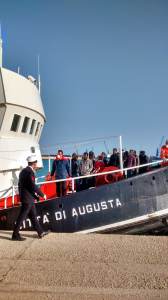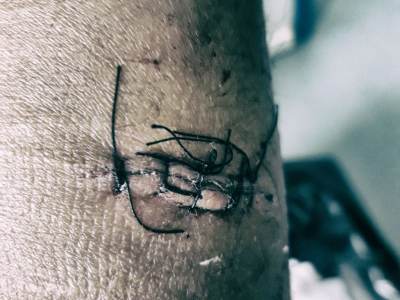The silence before and after the landing. Voices from Libyan hell
On February 25th, the corpse of five migrants arrived in the port of Augusta. They were on board of the military ship Cigala Fulgosi, which had taken refugees on board on already four different missions. For one day the attention of national media turned to the landings again, which seems foreseeable and usual, when the arrival of migrants is concomitant with people who didn’t survive the crossing. Especially when it concerns a higher number of deaths. Unfortunately, also the silence following the news was predictable and punctual, which was meant for reaching the national audience for a few minutes and with a few words and then to be forgotten, as it happens for a lot of events in the daily report.
Similarly to war bulletin the number of deaths was communicated in an act destined to ease one’s conscience, whereas the bigger outcry was reserved to the arrest of the presumed smugglers with published pictures, information about their nationality and concrete facts about the arrest by the police force, but without any reference to the circumstances that brought them behind the wheel of the ships. Unfortunately the manipulation of some events and the concealing of others go along the same lines with political decisions made by the European governments towards the direction of migration flows. European politics manifest themselves in control directories, discrimination, militarization and the summary selection of migrants who will be accepted and those migrants who won’t.
Suddenly there was silence around the investigation, which should be clarifying the causes of death of the five migrants that arrived in Augusta. The death was declared by suffocating, but under unexplained circumstances – not uncertain for those able to imagine, through reports and encounters with the arrivals, how the conditions must be during their departure in Libya. They speak of situations on the limit of survival, which are rarely found in the news stories and are often only proven by the marks on the bodies of the refugees. Some migrants that we met last week at the port of Augusta told us about this. “Before the boarding I was one month in Libya, locked in some sort of prison“ said Y., a young man from Cameroon. “I ate once a day and got systematically beaten by the Libyans, who vented themselves upon me and the other boys that waited for the departure when something went wrong with their business. During this time I saw three people disappear, because they refused to give away cigarettes or because they were talking at the wrong time. They were taken away forcefully and never came back. But all of that was no comparison to the hell I’ve seen before.“ „Before” implies thefts, robberies, months of captivity and violence altogether with other almost unimaginable brutalities for Y. and his companions. „In Libya it`s impossible to survive if you don’t hide and have a black skin-color. It can happen at every corner of the street that you run into armed adolescents, police officers or simple inhabitants, who are willing to kill you without a reason. Because you are invisible, without papers, without anything“ says another young man from Gambia. „I stayed for three months in Libya and did everything that was ordered, because I had no choice. Even if you decide to leave sometime, you can’t move back, no matter of terms and conditions, otherwise they just kill you.“ „We were only two days on the sea, we were lucky“, adds a man next to us. „To bring my family here, I was working for two years in Libya. With that money I could have gone to America. But now the only important thing is that we arrived here alive.“ Among the arrived migrants there are a lot who emphasize their luck, having survived a journey with those who didn’t survive. On some faces you can still see that they have seen death, like the young husband of one of the dead women, who is sitting at a distance from us and who stares into empty space. He couldn’t leave the boat before the corpse of his wife was taken away from board. Others really want to tell us what they have seen: „On my rubber boat it was so crowded that I was worried I could fall into the water every moment for a big part of the journey. That’s how we were herded on that boat. One young man on our boat died. When I noticed it after a while I started to cry, because I thought I would end the same way like the others forgotten at the bottom of the sea. Now that I arrived, I have to talk about and let everybody know what happens on the sea.“ A group of women from Cameroon tell us about the tragic situation that forced them to leave their native country. They draw our attention to the amount of little children that arrived: „On my boat there were at least three kids under the age of two years. Just those who have no choice at all begin that journey with such young children“. The stories become more and more and also the enquiries about where they will be transferred do. The new destination slowly takes over the ruling thoughts of these newcomers.
A few migrants that we meet in the following days in Pozzallo, close to the hotspot, are also marked by the impatience of knowing the new destinations and the waiting terms for future moving. They are allowed to leave the hotspot by the city in the mornings and in the afternoons, with prior agreement with the police and the personnel of the hotspot. On their wrist they wear a bracelet with their identification numbers and on their feet plastic flip-flops, which were given to them at their arrival. “I am here for 14 days. They told me that I would be transferred to another center right away, but until now, nothing”. He’s an adolescent from Gambia, that will soon be joined by a young man from Eritrea and after a while a dozen other migrants, mainly from Nigeria and Mali. Many of them have been staying in the hotspot for one week – in contrast to the supposed 48/72 hours of maximum stay in a CPSA*, as provided for by the law. But for hotspots, there still isn’t a normative reference. “Since we arrived they only gave one change of clothes, one pair of slippers and a phone card with 5 euros. We are so many in the center that taking a shower becomes a task and anyway, the water is freezing cold “, the people continue. “We all sleep together in one single space, men, women and children. The food I don’t know, I personally have difficulties eating it because we eat pasta every day and the portions are really small.” We ask whether the legal information they got was translated and understood and if they know about their actual legal situation: “At the beginning they took my fingerprints, without using any violence. I asked for international protection, but then I didn’t understand well what the next steps for me were, because, among other things, I just thought about the date of my transfer. Unfortunately everybody in the center only speaks Italian and the only thing I know, is that I have to wait, but for how long?” The situation is similar for at least five people of the group, among them the young man from Eritrea. We know that UNHCR and IOM* provided information about the legal situation after the last few arrivals. What we hear today from the migrants is just a huge frustration and impatience to leave the center. On top of that, we hear new statements how inside the Hotspot laws regarding living conditions and terms of reception are not respected. “I thought about asking for more clothes because I’m often cold and for a new mobile phone card to call my family. But in the end I never asked, because if I would do so, I probably would have to stay longer.” The stories about the experiences before the arrival continue and the curiosity for the new places and for the people they are going to meet become clear. When the moment of their return to the hotspot comes closer the fear of having to stay in there for a long time also rises again. “We almost can’t move inside. We can’t do anything, if we are not outside like now. We have no money. For how long will this go on?” This is their only question in this situation of severe discomfort. Soon, as we can see in a lot of initial reception centers, this question will be replaced by the worries about the delay of requested documents. It doesn’t need much to really understand how the insistence on this matter completely leads back to the conditions of fear and neglect, in which the migrants find themselves for days or weeks but which can also last for months or years. It becomes impossible to express themselves or to find a constructive confrontation with those who should welcome them and favor a sense of belonging in the new society they arrived in. Sometimes it is sufficient to just listen for a few hours. But in the face of indifference and the various mechanisms of exclusion, which are created around them every single day since the landing around them by the system, a lot of migrants can’t find any other way than holding on the hope for a better place or to a piece of paper, to feel stronger in claiming their right to freedom in Europe, that becomes more and more a fortress.
Lucia Borghi
Borderline Sicilia
*CPSA: Centri d’Accoglienza Staordinaria – Emergency Reception Centres
*IOM: International Organization for Migration
Translated by Barbara Staudenmaier


